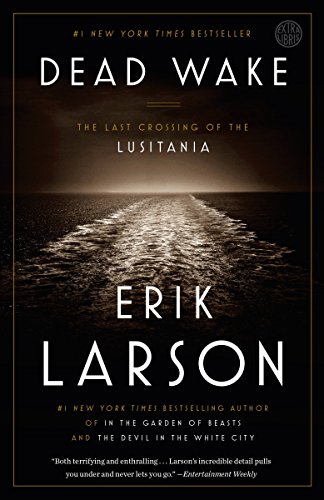From Amazon.com:
Erik Larson is not capable of writing anything less than a gripping account of history. All of his previous books have been spellbinding accounts of storms, cities, crimes, inventions, ships and/or war. In DEAD WAKE: The Last Crossing of the Lusitania, Larson returns to the subjects of war and ships and stirs in a potent mixture of international politics as well as a little romance to once again seduce his readers with a contemporary view of a historical situation.
Written to commemorate the 100th Anniversary of the sinking of the Lusitania, a Cunard passenger liner sunk by a German U-Boat, Larson’s account differs in several ways from other well-known books produced on the subject. Diana Preston’s LUSITANIA: An Epic Tragedy, published in 2002, is one of the best-written accounts of the disaster. The difference between Preston’s work and Larson’s might be found in the subtitle of the Larson book which emphasizes the crossing while Preston’s book is most memorable for its account of the sinking and its aftermath, particularly accounts of survival. No one can read Preston’s book without feeling as if he/she is clinging to a piece of wreckage in a cold, spring sea awaiting rescue. No one can read Larson’s book and not feel like the proverbial fly on the wall in the infamous Room 40 of the British Admiralty. While Preston addressed Room 40, in Larson’s writing, the room takes on a role and becomes a character (albeit not a very appealing one) in its own right.
 Dead Wake: The Last Cr...
Best Price: $1.99
Buy New $6.10
(as of 08:10 UTC - Details)
Dead Wake: The Last Cr...
Best Price: $1.99
Buy New $6.10
(as of 08:10 UTC - Details)
Larson skillfully gets into the mindset of Winston Churchill and how determined he was to see America enter the war. In the States, Larson goes back in time and brings President Woodrow Wilson to life through a love affair that seemed to take up more of his time than thinking about the suitability of America’s neutrality. Yet Larson allows readers to see Wilson in a most human light; perhaps the love affair gave him the strength for the decisions he had to make later. While the reader feels a connection with Wilson and also with the much-maligned but ultimately blameless Captain of the Lusitania, Captain Turner, utter horror and strong dislike is brought out when we read about Captain Schwieger of U-Boat 20 and, in a strange way, perhaps, even more, when we examine the real-life characters and goings-on within the Admiralty’s Room 40. Germany and Britain both emerge as more than a bit despicable.
The pluses of Larson’s latest work are his acute examination of Room 40, his up-close look at Woodrow Wilson, and his ability to swing between the behind-the-scenes action and balance his discoveries with a conventional but absorbing look at some of the passengers on board the Lusitania all while building a true and terrifying suspense in the narrative. His profile of Charles Lauriat, Boston bookseller, and collector of rare documents and drawings, is excellent. One sense that Larson was truly interested in Lauriat and might, having not been faced with producing a book to coincide with the 100th anniversary of the Lusitania’s sinking, have chosen Lauriat as a sole subject for a book or article.
Erik Larson can never disappoint. Whether one reads a great deal about WWI history, maritime disasters, or early 1900s international politics, there is something new to be learned in DEAD WAKE. For those who have read very little about the Lusitania, this book is an excellent starting point. As mentioned before, Diana Preston’s LUSITANIA: An Epic Tragedy tells a similar story but with a slightly different approach. Both books have something to offer, but Larson’s, being newer, may include some fresh revelations about the history we thought we knew.
 The Lusitania’s ...
Buy New $1.99
(as of 06:05 UTC - Details)
The Lusitania’s ...
Buy New $1.99
(as of 06:05 UTC - Details)
 We Who Dared to Say No...
Best Price: $2.50
Buy New $14.75
(as of 08:10 UTC - Details)
We Who Dared to Say No...
Best Price: $2.50
Buy New $14.75
(as of 08:10 UTC - Details)





